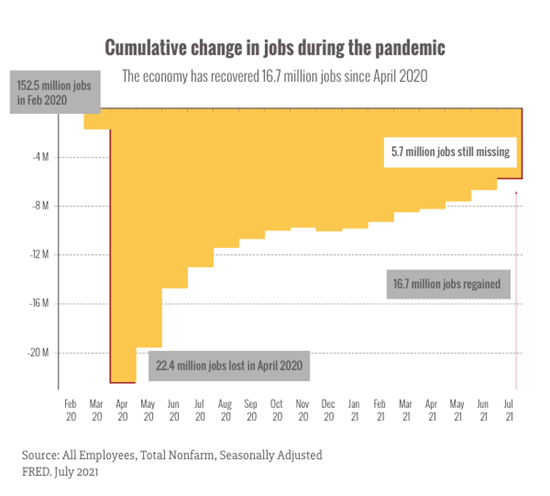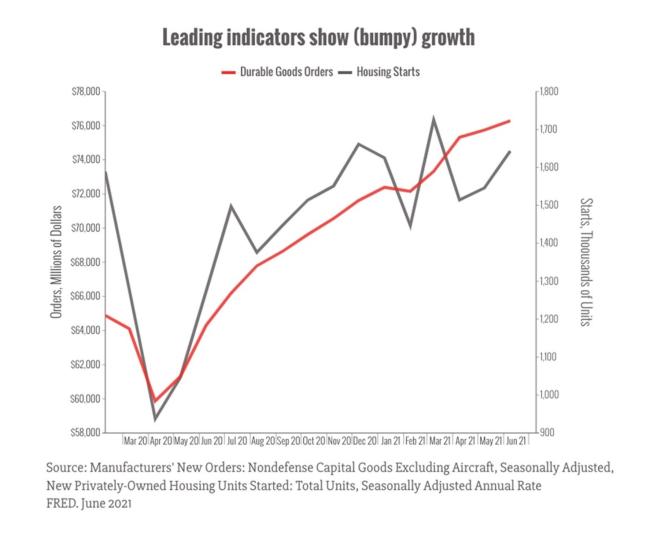How far we’ve come … and a client event update.
Hello Eagle Wealth Community,
Headlines are looking grim again, so let's pause and take stock.
Why are the headlines terrible?
Because the media loves drama. This is not news to you or us or anyone who pays attention. The 24-hour news cycle is there to whip up emotions and keep us glued to the latest "BREAKING NEWS."
So, what’s behind the noise and should we worry?
Before we jump into unpacking the news, let’s take a moment and remind ourselves of how far we’ve come since the pandemic began.
You can see it right here in this chart:
We've recovered the vast majority of jobs lost since the bottom of the pandemic's disruption last April. The economy is still missing several million jobs to regain pre-pandemic levels, but we've made up a lot of ground, and jobs growth is still strong.1
In fact, there are more job openings right now than job seekers to fill them.2
But there's an important caveat to the chart above.
The monthly jobs report is what economists call a "lagging" indicator, meaning that it's telling us where the economy was, not where it's going.
To figure out what might lie ahead, economists turn to "leading" economic indicators that help forecast future trends. So, what are the leading indicators telling us about the economy?
A couple of the most popular indicators are manufacturing orders for long-lasting (durable) goods, since companies don't like to order expensive equipment unless they expect to need it soon.
Another one is groundbreaking (starts) on new houses, which indicate how much demand builders expect for housing.
Let's take a look:
Both indicators suggest continued (if bumpy) growth. Now, those are just two sectors, and we want to be thorough, so let's take a look at a composite.
The Conference Board Leading Economic Index (LEI) gives us a quick overview each month of several indicators.
It increased by 0.7% in June, following a 1.2% increase in May, and a 1.3% increase in April, showing broad, but slowing growth.3
What does that tell us? That the economy still has legs.
Will the delta variant derail the recovery?
A serious slowdown due to the delta variant seems unlikely, but we could potentially see a bumpy fall, especially in vulnerable industries and areas with surging case counts.
There's also some potentially good news about the delta variant that we can take from other countries. India and Great Britain both experienced delta-driven surges earlier this summer.4
And what happened?
A steep and scary rise in case counts and hospitalizations...followed by a rapid decline. It seems that these fast-moving delta waves might burn themselves out.
Unfortunately, these surges come with a painful human cost to patients, overburdened medical staff, communities, and families. But, if this pattern holds true in the U.S., it doesn't appear that the economic impact will be heavy enough to derail the recovery.
All this to say, it's clear that the pandemic is still not over.
But we've come such a long way since the darkest days of 2020 and the road ahead still seems bright (if a little potholed).
Please remember to take panicky headlines with a shaker or two of salt.
We’re here and we’re keeping watch for you. Please reach out if you still have questions.
Be well,
Your Eagle Wealth Team
As financial planners, we always do our best to prepare for the unexpected. That includes this year’s annual client appreciation event.
We intended for this event to be a reunion of sorts. After plenty of virtual meetings, we hoped to come together, share the dancefloor, and give long-awaited hugs and handshakes. But there’s been no shortage of twists and turns lately, so we’ve decided to postpone.
Our close personal relationship with you is the best part of our job. That’s why your health and happiness is our number one priority.
Don’t fret Eagle Wealth community, we’re focusing our energy on planning the absolute best 2022 event. We can’t wait to see you soon!
P.S. Don’t forget you can still pick up complimentary High Desert Museum passes at the office. Or if you’re out of town check out the virtual exhibits here.
Buckle up, folks. We have some big news for you. Eagle Wealth partner, Mat Hunnicutt and his favorite girl, Jamie, tied the knot at a gorgeous 4th of July wedding.
With their matching cowboy boots, county music, and close family, they created the relaxed wedding they hoped for.
After all the excitement they enjoyed a few well-deserved evenings camping in the Steens Mountain area. (Pardon our loud round of applause and cheering.) We couldn’t be happier for this incredible couple.
|
|
|
|








